The New Midlife Revolution
CONSUMER INSIGHTS
In an era increasingly defined by the fluidity of identity and the dissolution of long-held norms, mature consumers are emerging not just as a powerful demographic, but as a cultural force reshaping industries from beauty to fashion to media. Age is now the new aspirational metric in beauty, fashion, and pop culture.

A Powerful Market, No Longer Ignored
Once dismissed as an economically passive group, mature consumers (typically those aged 50 and above) are now being recognised for what they truly are: a fast-growing, financially empowered, and aspirational segment. Mature consumers are no longer seen as a niche or declining market; they are taking centre stage.
From beauty campaigns to pop culture and fashion narratives, those aged 50 and beyond are not only being acknowledged but also celebrated. And crucially, they’re rewriting the rules of aspiration itself. This shift is not only numeric but cultural. No longer pigeonholed by outdated notions of decline or irrelevance, these consumers are becoming icons of resilience, style, and confidence.
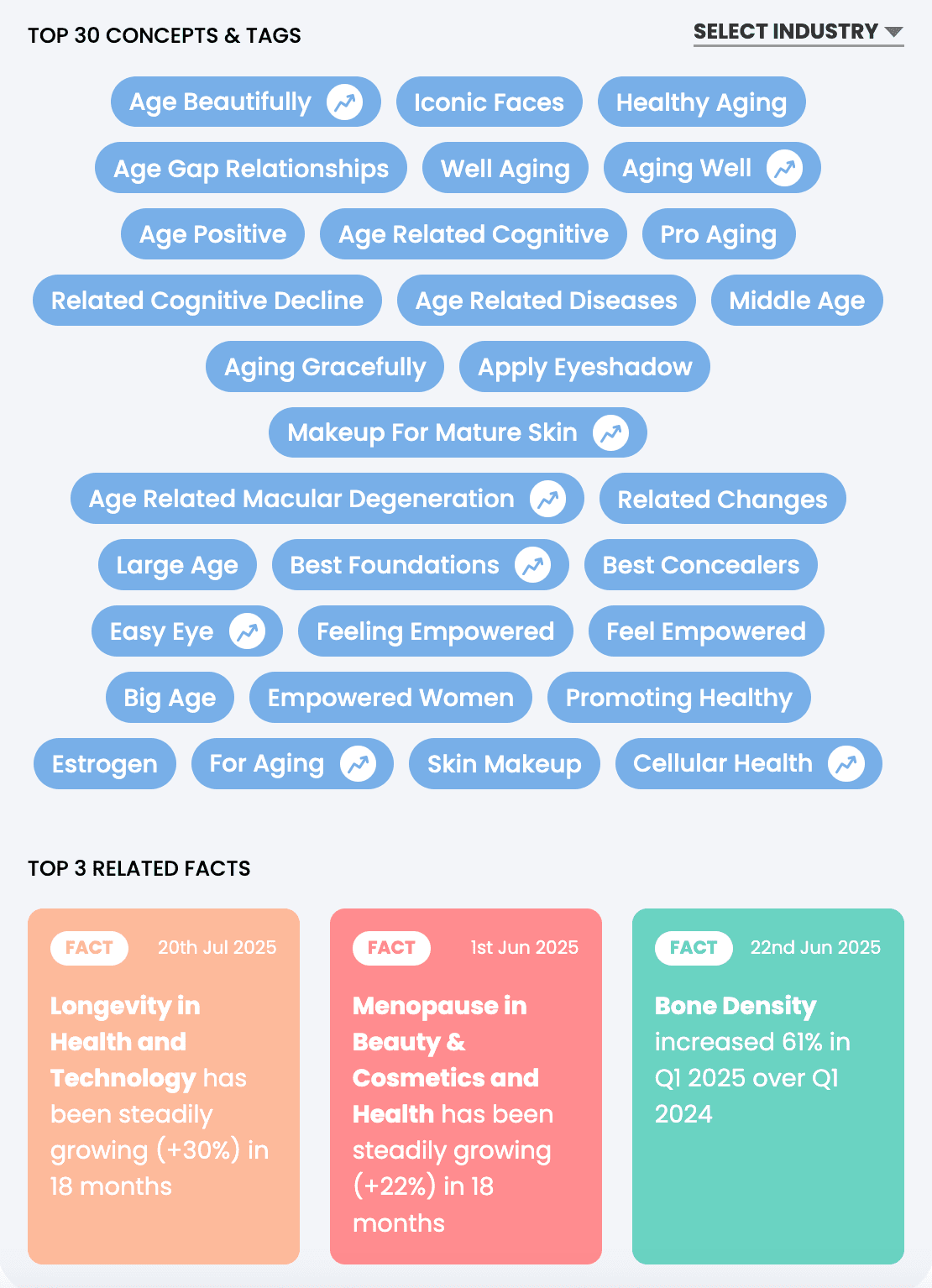
The top concepts, tags, and facts from our early adopter conversations in the "Midlife Revolution" trend (screenshot taken from the Nextatlas platform in July 2025)
From Anti-Ageing to Pro-Ageing
Where once the language of ageing was steeped in negativity, all “anti-wrinkle”, “rejuvenation”, and “fighting age”, today’s rhetoric tells a different story. “Pro-ageing” and “well-ageing”, have emerged as not only preferred marketing language, but as powerful reflections of a shifting social consciousness.
L’Oréal, the beauty titan known for defining global beauty norms, recently launched a skin-age calculator using lab-on-a-chip technology, designed to offer personalised longevity-focused skincare. Notably, the language used in this campaign is focused on supporting the skin’s natural evolution, not reversing it. According to Vogue Business, the initiative signals a bold move into “longevity science”, targeting ageing not as a problem to erase but a process to understand and support
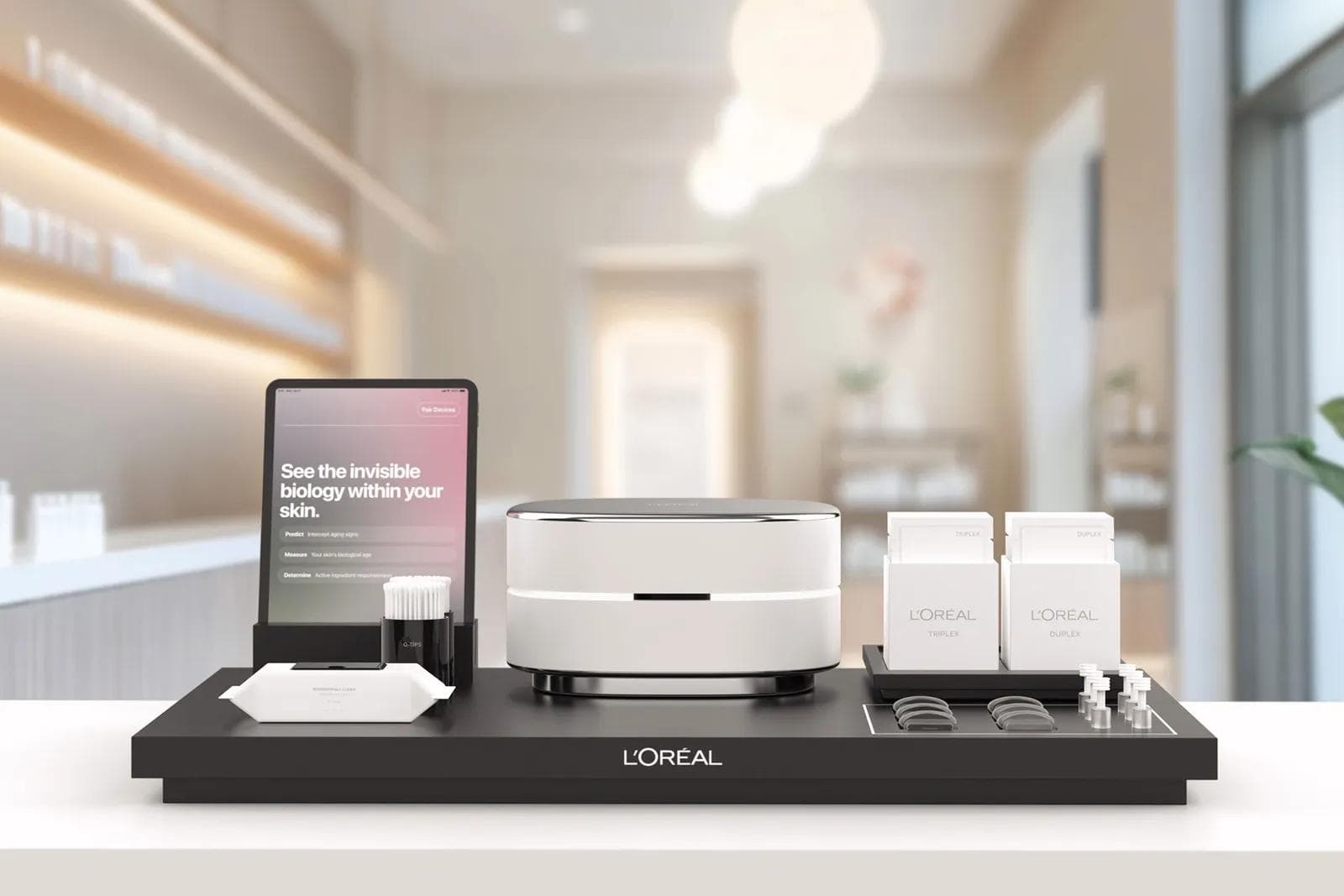
The Cell Bioprint tool on the counter, their new tool that can analyse a customer’s skin cells to predict their responsiveness to ingredients like retinol and detect potential issues before they emerge (credits: L’Oréal Group)
This shift isn’t limited to traditional players. Independent brands such as Stripes, founded by Naomi Watts, and All Golden by Sarah Creal, are championing formulations and campaigns specifically designed for women in midlife and beyond. Retailers like Sephora and Ulta are increasingly carving out shelf space for brands that cater to the hormonal and physiological changes of later life, not to “fix” them, but to celebrate them. Search terms like “mature skin care” and “mature skin makeup” have seen double-digit growth year-over-year, particularly on TikTok, reflecting an audience hungry for representation and relevance
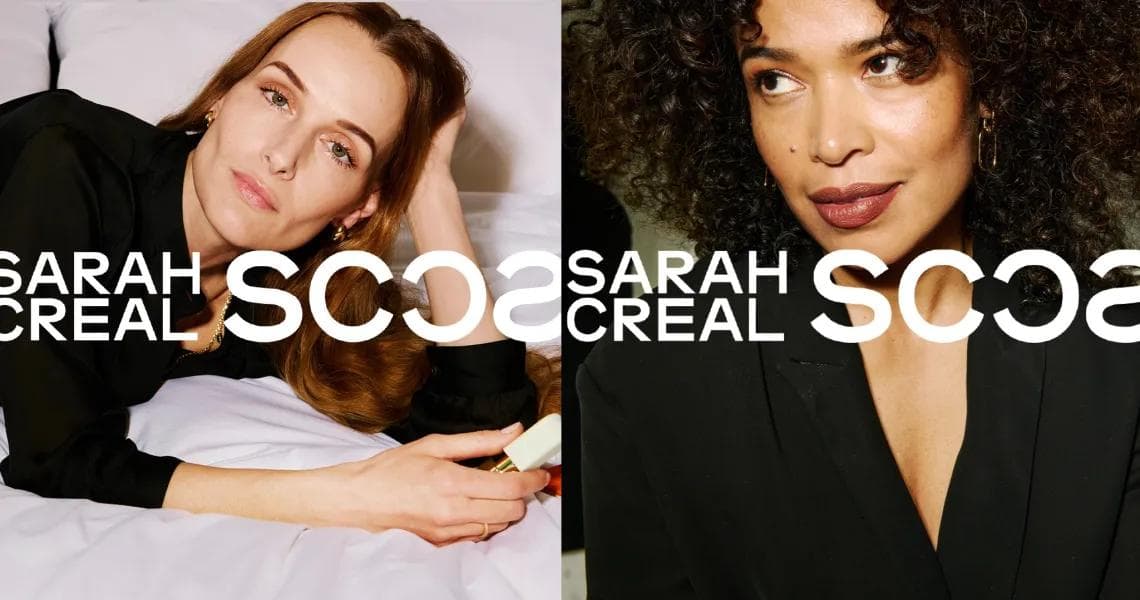
Credits: Sarah Creal
Pop Culture Reclaims the Mature Narrative
Alongside this commercial evolution, pop culture is undergoing its own kind of awakening. mature women increasingly depicted as active, aspirational figures who embrace their desires, challenging traditional social conventions around aging.
The 2025 release of "Babygirl", a film starring Nicole Kidman as a high-powered executive engaged in a romantic relationship with a much younger man, flips the script on typical age-gap dynamics. Directed by Halina Reijn, the film positions Kidman not as a cautionary tale or token of nostalgia, but as a complex, desiring protagonist. “I’m hit on more by men 15 years younger than those my age,” Kidman quipped in a recent interview, highlighting the growing normalisation, and even desirability, of older women in modern romance narratives

"Babygirl" film poster (credits: A24)
The release of "Bridget Jones: Mad About the Boy" this February only reinforced this trend. In it, Renée Zellweger returns as Bridget, now a widow navigating modern dating, balancing flirtations with both a school teacher and a much younger suitor. Far from playing into outdated tropes of desperation or decline, the film celebrates her autonomy, resilience, and sensuality. Bridget is far from settling because she’s just getting started.
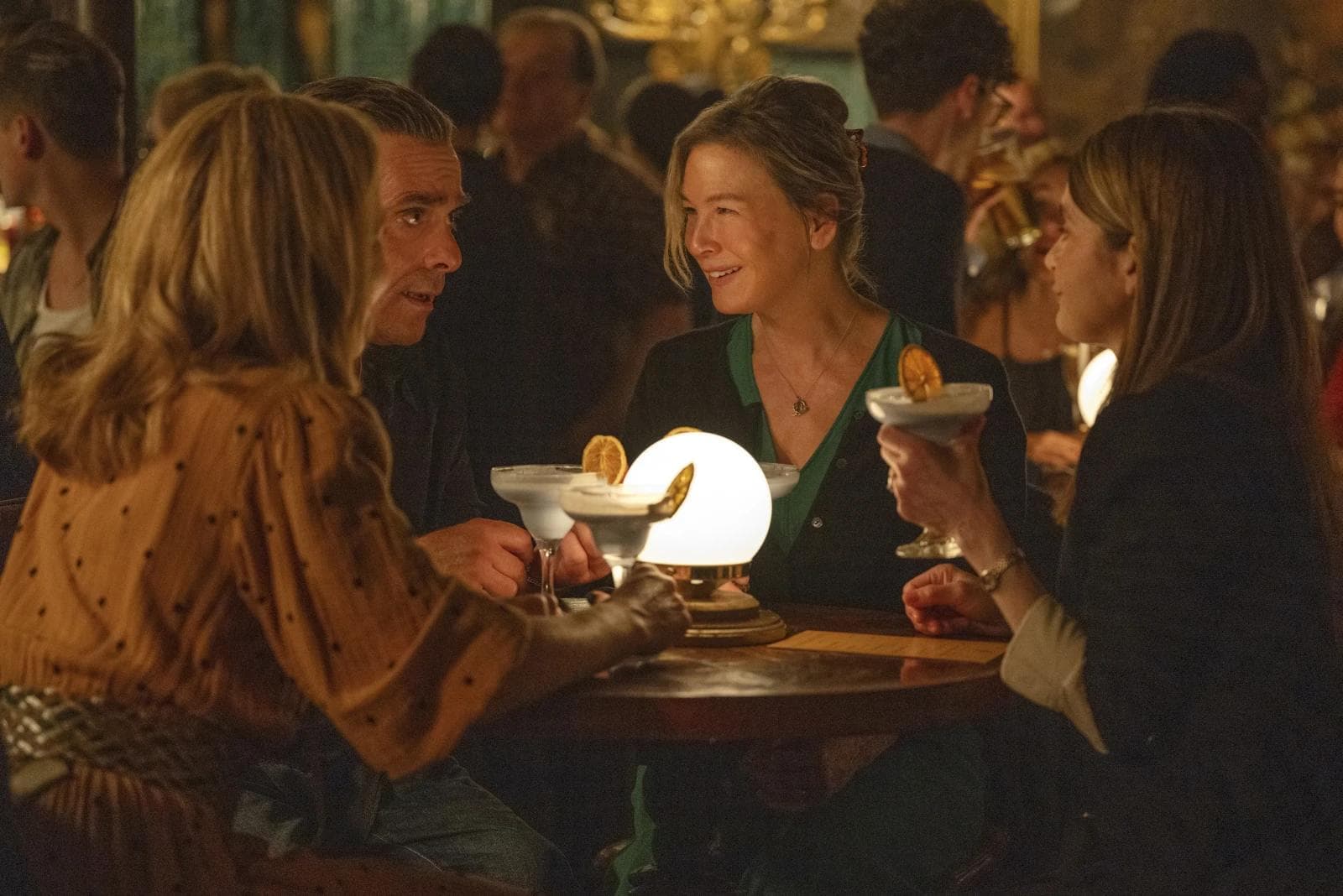
A scene from “Bridget Jones: Mad About the Boy” (credits: Jay Maidment/Universal Pictures via AP)
This narrative of mature agency is echoed by cultural icons like Jamie Lee Curtis. At 66, Curtis remains vocal about her refusal to submit to the cosmetic pressures of Hollywood. “Generations of women have been disfigured,” during the promotion of the latest "Freaky Friday" sequel. Her stance is both personal and political, a call to arms for women to reclaim ageing on their own terms. She continues to thrive creatively while advocating against the beauty industry’s obsession with artificial youth.

Credits going clockwise from the top left: Ali Wong’s special “Single Lady” from Netflix; Alisha Wetherill/"The Idea of You" from Prime, via Associated Press; "The Substance" via Mubi; "Last Summer" from Mubi via Sideshow/Janus Films.
Fashion's Shift: Iconic Over Instant
Similarly, the fashion industry is redefining what it means to be iconic, favoring longevity and timeless appeal over fleeting trends associated with youth. Being iconic is increasingly seen as the ability to stand the test of time, transcending fleeting trends and momentary fame. This appreciation for longevity in relevance marks a departure from the previous focus on youth and the novelty that it-girls typically represent.

61-year-old Demi Moore for J. Crew's A/W 2024 catalogue (credit: Max Farago/People)
“Library: Fashion and Elders” at The Met is a community-focused exhibition that explores how older adults express identity, memory, and creativity through personal style. Curated by Matthew Linde, it reframes fashion as lived experience rather than trend, featuring garments, books, and oral histories contributed by elders. By spotlighting ageing as a source of cultural richness, the exhibition challenges fashion’s youth-centric norms and positions elders as curators of their own narratives and valuable contributors to fashion history.
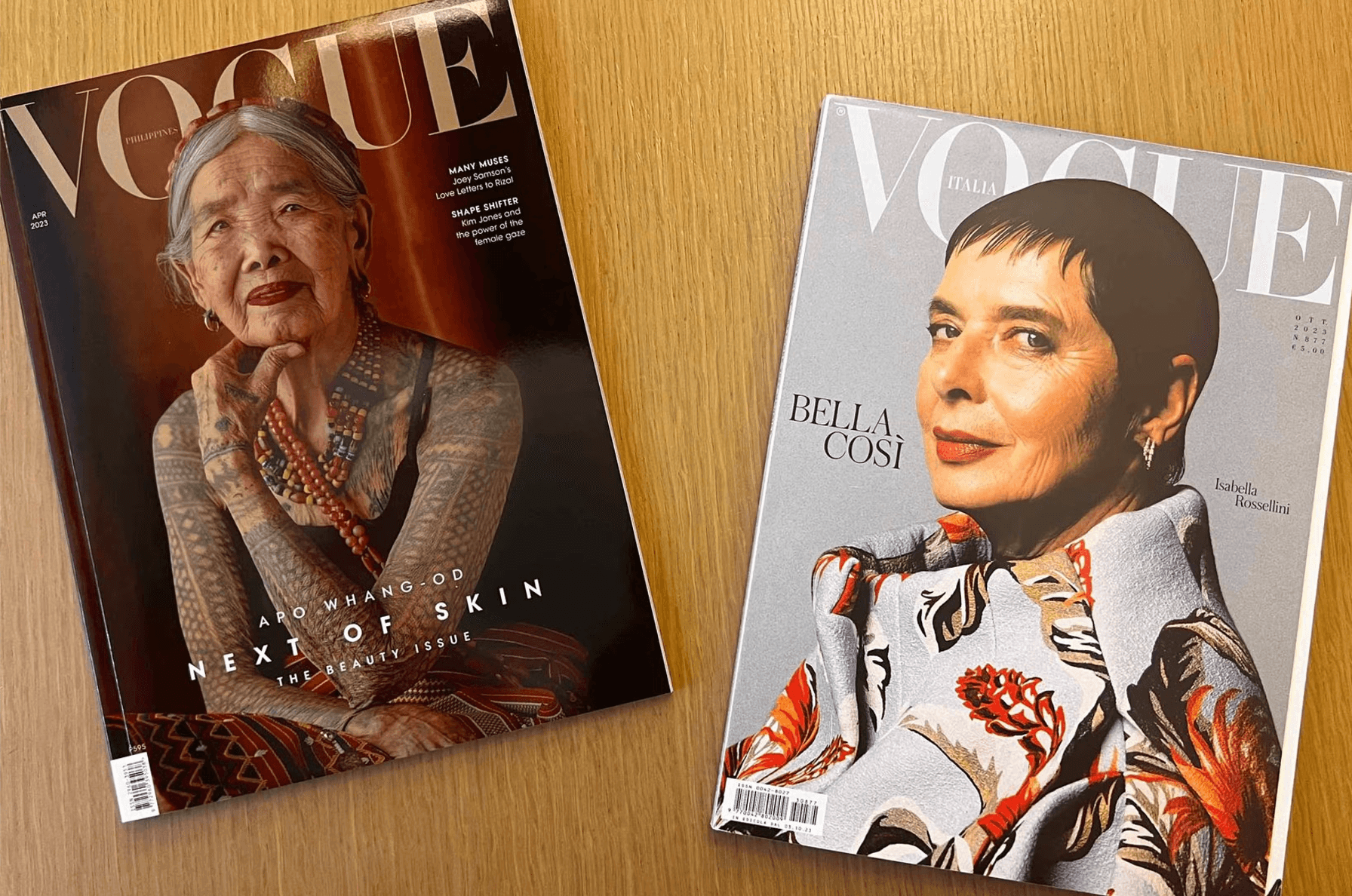
The cover of Vogue Philippines from April 2023 and the cover of Vogue Italia from October 2023 (credits: the Met Museum)
A Reframed Future
As our societies age and life expectancy rises, the definition of who gets to be aspirational is undergoing a profound reconfiguration. Brands that continue to centre youth as the default risk losing cultural relevance. Instead, those who embrace the richness of experience and the power of longevity will forge deeper, more sustainable relationships with consumers across generations.
Together, these shifts point toward a meaningful cultural transition. The idea that age equals invisibility is being dismantled. In its place is a new narrative, one that casts maturity not as the end of desirability or influence, but as its evolution.
In 2025, to be older is to be freer. Freer to express desire, to define one’s own beauty, and to take up space unapologetically. Brands and media that embrace this will not only stay relevant, they will help rewrite what aspiration looks like for generations to come.
What This Means for Brands
- Language matters: “Pro‑ ageing” and “well‑ ageing” replace “anti‑ ageing”, reframing marketing around acceptance, function, and confidence—not fear of decline.
- Narrative power: Mature women are now central to stories of desire, choice, and self‑actualisation, not marginal figures.
- Economic impact: The mature demographic is a growth market: beauty and wellness brands are launching premium, specialised offerings with high emotional resonance.
- Cultural shift: Maturity is increasingly viewed as an asset—bold, authentic, romantic, confident.

Trend lines, data, and information described in this article emerge from the ongoing analysis performed by Nextatlas on its global observation pool made of innovators, early adopters, industry insiders expressing their views on Twitter, Instagram, and Reddit.
To learn more about our AI, discover Nextatlas Methodology here
Related articles:
Italy
Torino - Via Stampatori 4, 10122(Operational headquarter)+39 011/0864065VAT number and registration number at the Registro delle Imprese di Cagliari: 03428550929 paid share capital € 167.740,00 — © 2024 iCoolhunt SpA.



